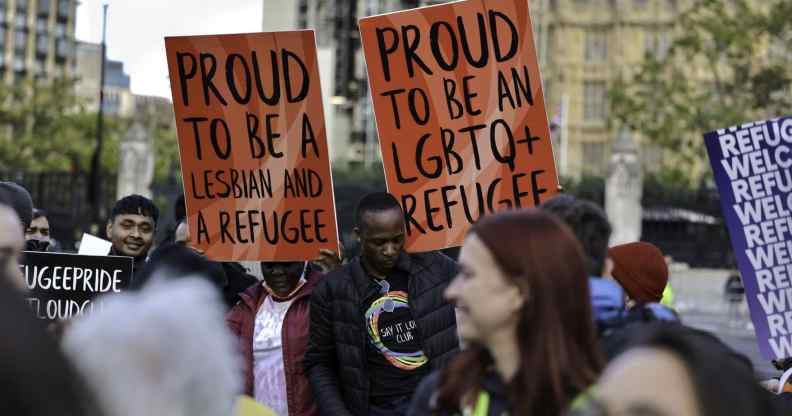Lesbian asylum seeker told she could look ‘less mannish’ to avoid persecution

A demonstration at Parliament Square to stand in solidarity with refugees in Britain to protest against the Nationality and Border Bill which is under review by committees at the House of Commons. (Hesther Ng/SOPA Images/LightRocket via Getty Images)
A legal expert has told the Women and Equalities Select Committee that Britain’s stance on “discretion” for LGBT+ asylum seekers is the “worst example” in Europe.
In 2010, the Supreme Court told the Home Office it must stop sending asylum seekers back to anti-LGBT+ countries with the expectation that they “exercise discretion” to avoid persecution.
But, speaking to MPs on Wednesday (23 February), University of Sussex professor and asylum legal expert Nuno Ferreira said that 12 years on, it is still common practice.
The landmark 2010 ruling allowed the Home Office to keep a modified discretion test for LGBT+ asylum seekers, she said.
According to Home Office guidance “people cannot be required to behave discreetly in order to avoid persecution”, but “if the claimant would live discreetly because they wanted to do so, or because of social pressures… then they [are] not a refugee”.
Ferreira has conducted extensive research on LGBT+ asylum in the UK, and told MPs that the Home Office was “pushing this discretion reading” at London tribunals, according to the Morning Star.
“Claimants who are clearly open about their sexuality are expected by some judges to change their conduct, become more discrete,” Ferreira told the committee.
He described a 2018 case in which a judge suggested a lesbian asylum seeker could be expected to look “less mannish” if she were returned to her home country.
Ferreira went into more detail on the specific case in his research – Queering Asylum in Europe – published last year.
With a more feminine haircut, she could avoid persecution.
“Zena’s claim depended on her credibility as a lesbian, as so many claims do,” Ferreira and his co-researchers wrote. “The judge deconstructed her appearance and manner to argue that she could safely return because, whether or not she was a lesbian, she did not need to look like one.”
The findings of the judge at the woman’s first appeal described as having a “slightly ‘mannish’ appearance… substantially attributable to the manner in which her hair was cut and the fact that she wore no make up”.
Ferreira and his co-researchers paraphrased the judge’s finding: that were she to return to her home country of Kenya, “she need not look [like a lesbian]: she was ‘mannish’ but at the same time had a small physique, so with a more feminine haircut could avoid persecution”. The judge did not find her asylum claim credible; this line of reasoning was part of the basis for the decision later being overturned by an upper tribunal.
Ferreira told the committee: “We also need to consider that SOGI [Sexual Orientation and Gender Identity] claimants often escape their home country after having gone to great lengths to hide their sexuality and were unsuccessful.”
“This is a dangerous policy because it assumes that decision-makers can establish the future behaviour of an individual and ignore the fact that choosing whether or not to disclose their sexual orientation if they are sent back to their country of origin is rarely within their control,” he added.
“We need to make sure that the Home Office policy eliminates all traces of discretion logic.”
In response, barrister Dr S Chelvan told the committee: “It’s not a policy, it’s a legal test. So the Home Office can’t be blamed for following something which is still, in law, a legal test.”
He explained that “if a person only chooses to be discrete because of personal and social pressure, they are not a refugee”. Those who have a “material reason” to be “discrete”, such as the threat of violence, would be considered a refugee.
‘Discretion test’ is ‘torturous’ for LGBT+ asylum seekers
In the Queering Asylum in Europe research, Ferreira describes the discretion test imposed on LGBT+ asylum seekers by the Home Office as “tortuous” and “widely criticised as unreasonable, discriminatory and unworkable by both scholars and the UK Equality and Human Rights Commission, and runs against UNHCR guidance”.
The Women and Equalities Select Committee is carrying out an inquiry into equality and the UK asylum process, aiming to assess “how far the government is able to address discrimination or specific dangers for those with protected characteristics within the existing system”.
During the session, MPs also considered the Priti Patel’s Nationality and Borders Bill and its impact on LGBT+ asylum seekers.
Dubbed the “anti-refugee bill”, it has been described by Refugee Action as “the biggest attack on the refugee protection system that we have ever seen”.
With queer asylum seekers already required to “prove” that they are LGBT+ and provide evidence that they would be persecuted on that basis, the bill would increase the burden of proof from a “reasonable degree of likelihood” that you’ll face persecution, to the far higher level of “balance of probabilities”.
It would also restrict protection to refugees who arrive through “official” routes like refugee resettlement programmes or on a visa, often impossible for LGBT+ refugees to access when fleeing their homes.
Anyone arriving by any other means could be deemed “inadmissible” and jailed.
Leila Zadeh, executive director of Rainbow Migration, told the committee: “We are extremely concerned that the way the Nationality and Borders Bill will increase the standard of proof will mean that many LGBTQIA+ people will not find safety in this country.”

